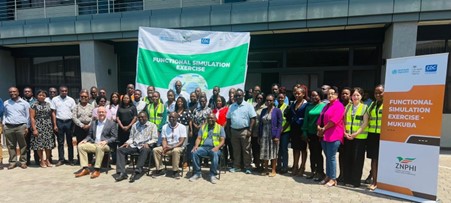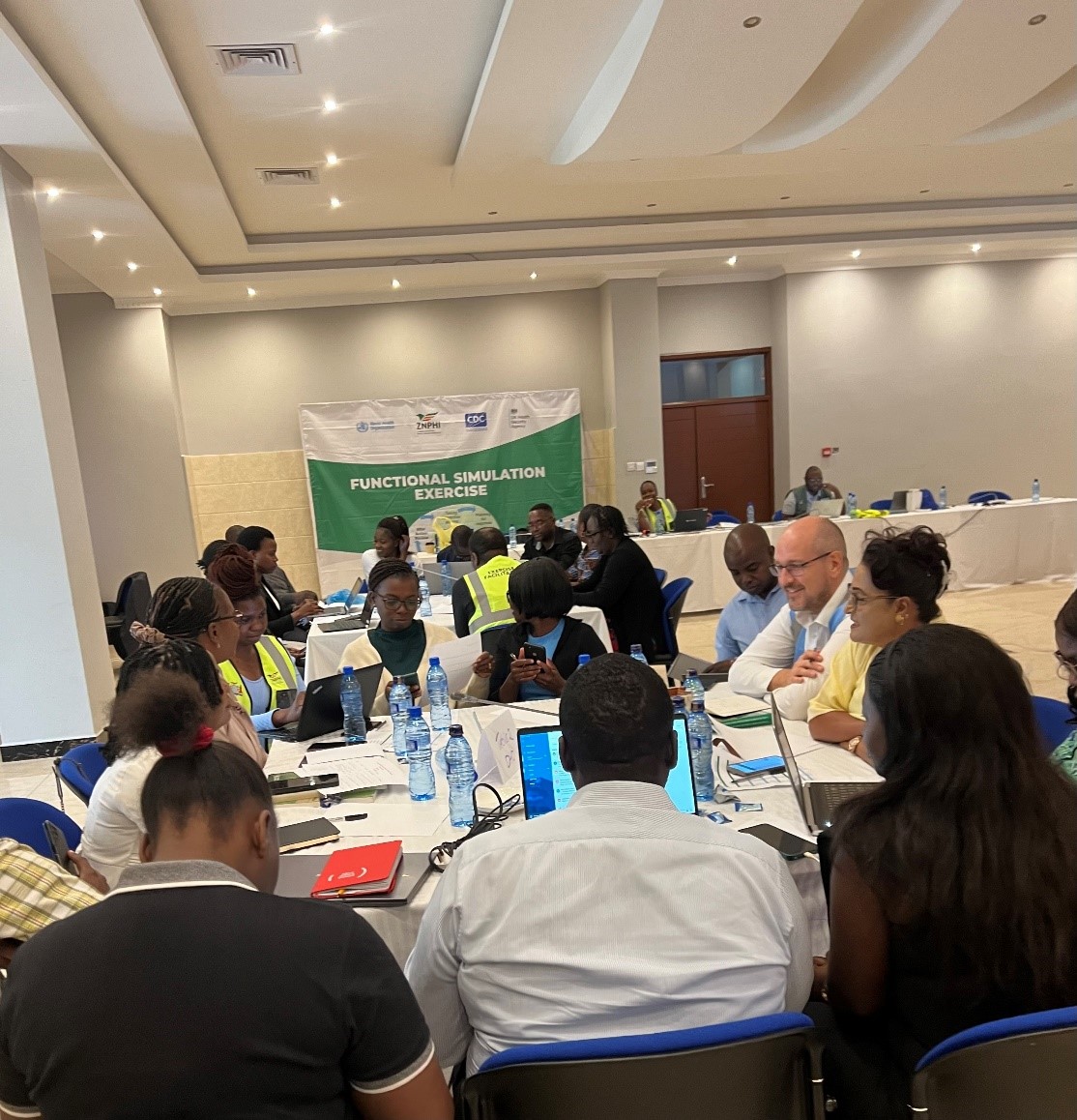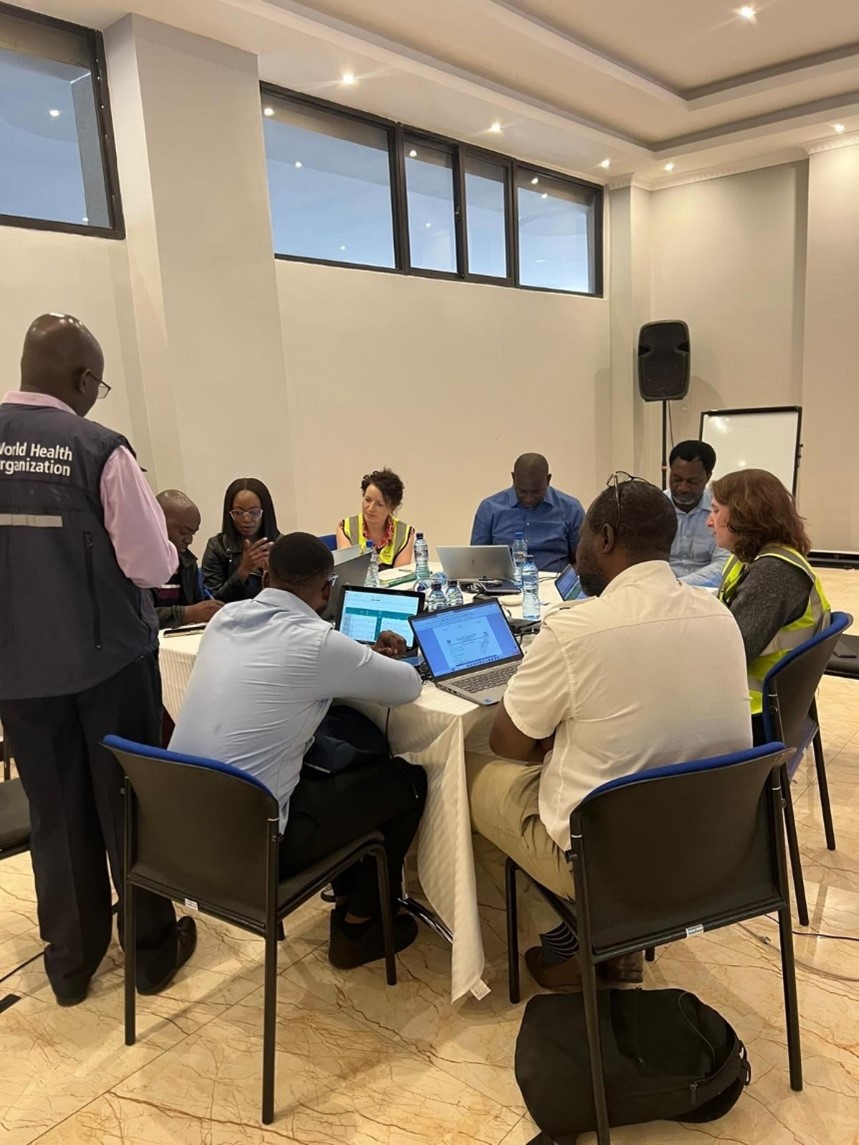
In October, the IHR-SP Emergency Preparedness Resilience and Response (EPRR) Team worked with colleagues from the Zambia National Public Health Institute (ZNHPI) on the delivery of Exercise Mukuba. The purpose of this functional Simulation Exercise (SimEx) was to assess the preparedness and response mechanisms in place in the event of an outbreak of mpox.
The newly emerged strain of mpox known as clade 1b was first detected in Democratic Republic of the Congo (DRC) in late 2023 and has since spread to a further 17 countries on the continent. Growing concern around this new viral strain was recognised by Africa CDC in its declaration of the outbreak as a Public Health Emergency of Continental Security and by WHO in declaring a Public Health Emergency of International Concern. Ndola, capital of the Copperbelt Province in Northern Zambia was crucial as the location of this exercise, as this province borders neighbouring DRC and has a lot of movement of people due to local industry and mining.
Preparing to respond
Recognising the threat, ZNPHI and the Zambian Ministry of Health (MoH) used this SimEx to assess and validate current response mechanisms in place for mpox, especially focused on the communication and coordination across local and national public health levels. Working with ZNPHI and the Zambian Ministry of Health, EPRR technical advisors from IHR-SP led the technical planning process from exercise design, development of materials, scenarios and injects, and creating an evaluator checklist.
The exercise took place over two days and involved 55 participants from across the local Health Facilities, the District Health Office (DHO) and Provincial Health Office (PHO), who were all present in Ndola as well as staff from the ZNPHI based at the National Public Health Emergency Operations Centre (PHEOC), who joined virtually.
The exercise consisted of the build-up of a fictional scenario where a case of mpox clade 1b had been suspected, confirmed, and then transmitted locally and over time, nationally. Participants from across the various levels were asked to respond to the various elements of this scenario as if they were responding in a real-life situation e.g. how would the Health Facility staff confirm the case, how would the DHO investigate the outbreak, how would communication between DHO and PHO be sustained, how would the National PHEOC coordinate and engage across all levels. Throughout the SimEx, IHR-SP’s EPRR technical advisors were part of the exercise management team and provided essential support through the roles of exercise controller, facilitation, and evaluation.
The exercise was very successful and through the simulated responses and debriefs that followed, several areas of good practice and areas for improvement in the response systems were identified. These are currently being complied by ZNPHI colleagues in a report to be shared with ZNPHI and MoH senior leadership.

Long term support for simulation exercises in Zambia
ZNPHI has been interested in developing the ability to plan and deliver exercises since its establishment as an organisation. IHR-SP supported this by organising a knowledge exchange between ZNPHI colleagues, including the Director General, Prof Roma Chilengi and EPR lead Prof Nathan Kapata, and the Nigerian Centre for Disease Control in 2022, where they observed NCDC’s well established Simulation Exercise Programme ‘Keep Pushing’.
This knowledge exchange led to further support from IHR-SP in delivering SimEx management training for ZNPHI staff and One Health partners to enable the design and delivery of exercises independently. Building on this, IHR-SP supported the development of the ZNPHI SimEx Framework; the first of its kind for Africa. This is due to be finalised by the end of 2024.
ZNPHI with support from IHR-SP and partners such as WHO, Africa CDC, US CDC and others has resulted in simulation exercises being used to assess response to emerging threats with quick turnaround in Zambia.
On the same week that Exercise Mukuba was completed, Zambia confirmed its first case of mpox. The timeliness of this SimEx meant that staff at ZNPHI’s national PHEOC could use the plans and procedures and the lessons identified during this SimEx to respond.

